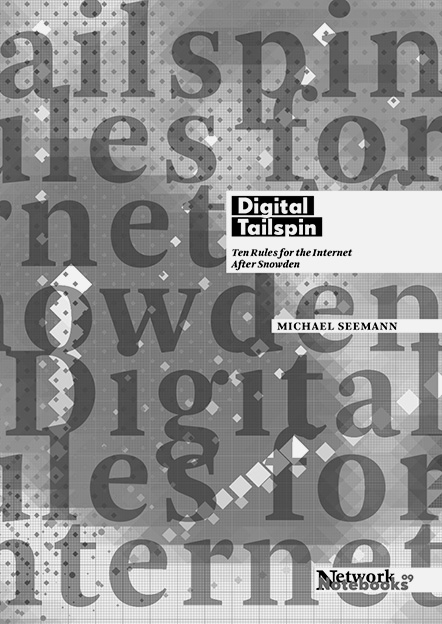Digital Tailspin
Ten Rules for the Internet After Snowden
April 13, 2015review,
Michael Seemann, Digital Tailspin: Ten Rules for the Internet After Snowden, Network Notebooks 09, Institute of Network Cultures, Amsterdam, 2015, ISBN 9789082234589

With the reauthorisation of the USA PATRIOT Act up for contestation on 1 June 2015, German net activist Michael Seemann’s recent book Digital Tailspin: Ten Rules for the Internet After Snowden couldn’t be a timelier contribution to the debates surrounding mass digital surveillance, network neutrality and information freedom. Seemann’s insights reverberate far beyond the issue of government surveillance, however, as they depart from the awareness that the datafication of life profoundly affects us all on both the individual and collective level, and that the algorithmic filtering of information has reduced reality to a false image entirely of our own (and of corporations’) device.
This reader put out by the Institute of Network Cultures in Amsterdam is the ninth edition in the exciting Network Notebook series, which explores cultural activities as topical and varied as the selfie, the offline library, tactical media strategies, and glitch art, among other markers of our time. Seemann essentially provides a handbook of symptoms and strategies that might help us identify and manoeuvre our way through this generalised condition or new paradigm of what he calls Kontrollverlust: the total loss of control of information in the digital age. Taking mass surveillance and Kontrollverlust as our “default settings,” the author builds a convincing ethics and practice of a post-privacy Internet, weaving in analogies and important lessons from the fields of activism, artistic practice, racial politics, feminism, clandestine migration, the monitoring and scrutinising of citizens receiving social benefits, and even our culture of public online shaming. More crucially, he argues that this informational tailspin is met with a cognitive and emotional lack, seeing people — unaware of their emergent subjectivity and power — rendered unable to imagine a different Internet, as they continue to operate within the outdated frameworks of privacy, closed circulation and centralised platforms. To fully explore and harness the possibilities contained within this new and otherwise disorienting reality, Seemann maintains we must wipe the conceptual screen blank and begin counting from zero.
First and foremost we must take an inventory of our priorities and what we think we know. Central to this task is elevating the importance of the query and platform neutrality. In doing so, Seeman does not suggest that we simply succumb to calls for a re-nationalised, fenced-in net in the face of the NSA revelations that spurred collective paranoia on a global scale. On the contrary, he rejects proposals for building alternative, national net infrastructures, warning that they are useless in treading the totalising reality of entangled global surveillance networks. Moreover, such privacy-geared approaches paradoxically encourage even more stringent border fortifications and laws, essentially granting the state more power, and paving the way for more pervasive forms of policing and centralised control mechanisms. In this sense, Seemann reminds us that the state has emerged perhaps stronger than ever before, having established a monopoly of power over today’s primary space of knowledge production and circulation: the Internet, and more specifically, online platforms.
But technology itself does not translate to power or disempowerment; rather, it is our use of its tools that holds the potential of shaping or undermining political action and social change. Against the state’s colonisation of online life, Seemann charts several escape routes that could guide us out of the current impasse. If platforms have become the predominant site of social discourse formation, as he argues, and the query is at once product and producer of publics online (albeit a public that is always necessarily projected into the future), then the filtered query holds significant political import for collective coordination.
His proposition of "filter sovereignty" within the parameters of open data encapsulates a pure end-to-end approach in which users control the filtering of data they simultaneously create and digest. The real question is to what extent we are really free to think, if our realities are controlled by algorithmically filtered information delivered to us by the likes of Google, Facebook, and Twitter, and how we might otherwise mobilise the “organizational power of the query.” Filter sovereignty demands of us to simultaneously surrender to Kontrollverlust and embrace open information and the ensuing concomitant streams of redundant data. It calls on us to engage more actively, responsibly, and patiently with digital information. This would satisfy something akin to an ethics of the online Other as well, as closed platforms by their very nature breach what Seemann calls “the radical right of the inquirer,” just as much as they limit the free speech of the sender.
What is at stake in this book are ways of harvesting Kontrollverlust so as to galvanise a new culture of democratic information exchange that is strengthened, not threatened, by the digital tailspin. Seemann’s is a remarkably brave and visionary proposition, and the varying strategies he maps out will surely revitalise the discourse of net theory and digital freedom for some time to come. While it might be tempting to claim that his ideas indirectly anticipate the advent of new forms of creative, cognitive labour that could potentially operate outside of the click-for-profit models imposed on us from above, Seemann notes that closed platforms will continue to exist as long as capitalism is alive. Still, he urges us to remember that Google and Facebook are neither the first nor last giants of the Internet, and furthermore, that we are only in the nascent stages of a new paradigm that is ripe for more rigorous interpolation.
Şeyma Bayram is a writer, editor and curator based in New York City. She received her BA and MA from the State University of New York at Binghamton.